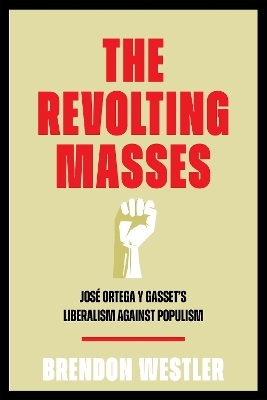
The Revolting Masses
José Ortega y Gasset’s Liberalism Against Populism
Seiten
2024
University of Pennsylvania Press (Verlag)
978-1-5128-2600-5 (ISBN)
University of Pennsylvania Press (Verlag)
978-1-5128-2600-5 (ISBN)
José Ortega y Gasset (1883–1955) was a Spanish philosopher and essayist best known for The Revolt of the Masses, first translated into English in 1932. In it, Ortega critiques a populist deformation of democracy by the rise of a “mass mentality” characterized by selfishness, a lack of curiosity, and a general indifference to the opinions and attitudes of others. However, as Brendon Westler makes clear, we need to look beyond Ortega’s arguments about populism and democracy in his most famous work to recover the philosopher’s expansive political outlook and to identify his valuable contributions to the history and advancement of liberalism.
Westler’s book reconstructs Ortega’s political theory, underscoring its distinctive historical origins as well as the ways in which it might be instructive to us today. Through an exploration of works less familiar to an English-speaking audience, such as Concord and Liberty, “Vieja y nueva política,” “De Europa meditatio Quaedam,” and “Democracia morbosa,” combined with a sensitivity to larger social and political ideas circulating within Spain, The Revolting Masses traces the contours of Ortega’s approach to politics. Westler argues that reading texts written over the course of the philosopher’s entire career, in combination with The Revolt of the Masses, offers a more complete picture of Ortega’s political thought—one that advocates for a liberal ethos as an answer to populism and promotes both individual freedom and the preservation of community bonds.
As The Revolting Masses shows, Ortega was, above all, a philosopher who reflected on what it would take for people of differing beliefs to live together. His unique conception of liberalism, grounded in the Spanish tradition, not only emphasizes pluralism and diversity of thought and institutions but also serves as a potential antidote to the populism of our present moment.
Westler’s book reconstructs Ortega’s political theory, underscoring its distinctive historical origins as well as the ways in which it might be instructive to us today. Through an exploration of works less familiar to an English-speaking audience, such as Concord and Liberty, “Vieja y nueva política,” “De Europa meditatio Quaedam,” and “Democracia morbosa,” combined with a sensitivity to larger social and political ideas circulating within Spain, The Revolting Masses traces the contours of Ortega’s approach to politics. Westler argues that reading texts written over the course of the philosopher’s entire career, in combination with The Revolt of the Masses, offers a more complete picture of Ortega’s political thought—one that advocates for a liberal ethos as an answer to populism and promotes both individual freedom and the preservation of community bonds.
As The Revolting Masses shows, Ortega was, above all, a philosopher who reflected on what it would take for people of differing beliefs to live together. His unique conception of liberalism, grounded in the Spanish tradition, not only emphasizes pluralism and diversity of thought and institutions but also serves as a potential antidote to the populism of our present moment.
Brendon Westler is Assistant Professor of Philosophy at St. Olaf College.
| Erscheinungsdatum | 07.05.2024 |
|---|---|
| Zusatzinfo | n/a |
| Verlagsort | Pennsylvania |
| Sprache | englisch |
| Maße | 152 x 229 mm |
| Themenwelt | Geisteswissenschaften ► Geschichte ► Regional- / Ländergeschichte |
| Geisteswissenschaften ► Philosophie | |
| Sozialwissenschaften ► Politik / Verwaltung ► Politische Systeme | |
| Sozialwissenschaften ► Politik / Verwaltung ► Politische Theorie | |
| ISBN-10 | 1-5128-2600-6 / 1512826006 |
| ISBN-13 | 978-1-5128-2600-5 / 9781512826005 |
| Zustand | Neuware |
| Informationen gemäß Produktsicherheitsverordnung (GPSR) | |
| Haben Sie eine Frage zum Produkt? |


